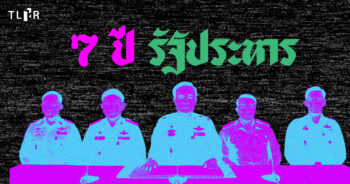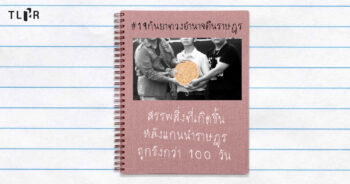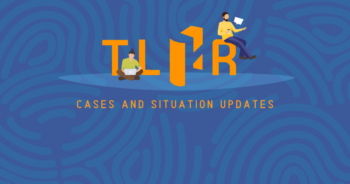During the protest movement for rights, liberties, and democracy that began in 2020, youths- any persons younger than 18 years old- have played a critical role in organizing and participating in political activities inside and outside their educational institutions. They have also been actively contributing to pushing the limits of public discussion on social and political issues in the online world via various platforms.
As the youth voiced themselves to call for a better future for their generation, the government did not respond by listening to their demands. Instead, they resorted to increasing the use of judicial harassment to suppress the youth’s political expression. Accordingly, the number of youths charged for their involvement in political activities has been consistently soaring from October 2020 to the present.
According to Thai Lawyer for Human Rights (TLHR)’s documentation records, from 18 July 2020, when the Free Youth Movement’s first demonstration started, to 31 May 2021, at least 43 youths have been charged in 44 cases. Notably, eight of them were charged with lese majeste under Article 112 of the Criminal Code.
Overview on the progress of cases against the youth
As of the end of May 2021, the majority of cases against youth political activists are in the inquiry stage. Thirty-three cases are currently pending investigation from police officers or public prosecutors.
On the other hand, four youths have already been indicted by the public prosecutor in three cases, thus putting them on trial at the Central Juvenile and Family Court. Three were indicted for alleged violations of the Severe Emergency Decree, previously enforced in Bangkok during the #15OctRallyAtRatchaprasong. In addition, another person has been indicted in two cases: One for alleged violations of the Emergency Decree during the #1NovRally and violations of Article 112 of the Criminal Code during the #6DecRally.
Furthermore, there are eight more cases against youths that already ended. All of them contain minor offenses and ended because the defendants chose to plead guilty and paid the fine ordered by the authorities., The defendants were prosecuted under the Act on the Maintenance of the Cleanliness and Orderliness of the Country in six cases, the Public Assembly Act in one case, and Section 397 of the Criminal Code (Causing nuisance) in one case. The amount of imposed fines ranged from 100 to 2,000 THB.
Remarkably, no cases ended because the prosecutor decided to order a non-prosecution, even though many youths have filed a petition requesting the prosecutor to drop their cases. These youths insisted that they did not commit the offenses; the alleged violations constituted the rightful exercise of their freedom of expression and peaceful assembly. Therefore, the indictment would not have any benefits for the public.
Eight charged with royal defamation in seven cases: One already indicted by the prosecutor
Eight youths have been accused of violating the lese majeste provision under Article 112 of the Criminal Code in seven cases. The youngest accused person is 14 years old. Among the eight persons, five were charged due to complaints filed by ordinary people.
In these cases, the public prosecutor already indicted one person, Thanakorn (Surname withheld), for giving a political speech during the #6DecRally demonstration. Moreover, Thanakorn has also been charged under Article 112 in a separate case, which currently remains pending police investigation, for his involvement in the #EverybodyWearsACropTop activity.
29 warrantless arrests of the youth: Two persons physically assaulted during the arrest
TLHR documented 29 arrests of youths during their participation in protests and other political activities. Many youths were also arrested multiple times. In total, there are 18 youths arrested in 14 cases. According to TLHR’s documentation records, 17 persons were taken to the Region 1 Border Patrol Police Bureau in Pathumthani Province, which is not legally recognized as a detention facility.
TLHR found that, during every arrest, the authorities did not check whether the arrested persons are minors or not. Accordingly, the arrested youths were mixed with the arrested adults and subjected to the same fetters and handcuffs. While this type of arrest is not lawful, the Juvenile and Family Court ruled during the arrest verification process that the authorities carried out the arrest in a legitimate manner under the law. This decision raised a critical question of whether the Juvenile and Family Court is appropriately performing its duty to protect the rights of children and youths.
In the cases of two minors arrested during the crackdown on the #20MarRally near the Wan Chat Bridge, the police officers physically assaulted them. Eventually, they injured a youth, who then had to be hospitalized. Again, during the arrest verification, the Court ruled that the arrest was carried out lawfully.
Arrested youths more likely to require bail than adult counterparts despite reporting to the authorities per their summons
Youths arrested during their participation in protests or political activities will be taken by the inquiry officers to Court for verifying the arrest and issuing a warrant. The Court also tends to rule that the arrest is lawful and authorized the inquiry officer may hold the youths in a requested detention facility. Accordingly, 26 youths in 13 cases needed to file for a bail application after getting arrested during the protests.
When a youth reported to the authorities to acknowledge their charges after receiving a summons, the inquiry officer may use discretion to take the youth to court to request an verification of the arrest and issue a warrant. The Court often agreed to the inquiry officer’s requests. Thus, at least six persons in eight cases needed to file a bail application even though they followed the order in the summons. Notably, the authorities treated adults differently. If their adult counterparts reported to the authorities per the summons, the authorities would not take them to court to request a remand.
The Central Juvenile and Family Court tends to grant bail without requiring any surety or determining only a low amount of surety. However, the guarantor needs to be a relative of the accused. Therefore, youths who do not live with their family members had to encounter difficulties in accessing the right to bail.
“Special measures in lieu of criminal prosecution”: Legal solutions or perpetuation of human rights violations?
The Juvenile and Family Court and Procedure Act permits youths facing charges to receive “special measures in lieu of criminal prosecution” upon the legally prescribed conditions that they have not been sentenced by a final judgment in another criminal case and show their remorse before the prosecution.
TLHR observed the pattern of prosecuting youths who participated in protests or political activities. Even though numerous people join these activities, the authorities tend to enforce the law selectively by charging only a specific “target group” under the State’s close surveillance. Therefore, at least 12 youths have been charged in more than one case. In addition, two youths had entered the track of “special measures,” but they were ordered to leave the program by the director of the Observation Center because the police later charged them in a separate case for their involvement in other protests.
The special measures in lieu of criminal prosecution require a participation in a rehabilitation plan. According to the youths who underwent this procedure, the plan mainly features compulsory community services. However, such a program still cannot effectively “rehabilitate” the participants’ behaviors. Furthermore, the activities under this program perpetuate the personality cult, which contradicts the youths’ anti-authoritarian ideology. Therefore, many of them refused to enter this track of special measures.
Additionally, in most cases against youth activists, the charges stemmed from alleged violations during their exercise of the rights and freedom of expression and assembly to demand a better future for themselves and their society. If they agreed to show “remorse” to access the special measures, they would be indirectly accepting that their calls for a better future are “wrong.” Consequently, many youths chose to fight the lawsuits, even though that means they would have to shoulder more burdens than people of similar ages in other societies where people can express themselves freely.



